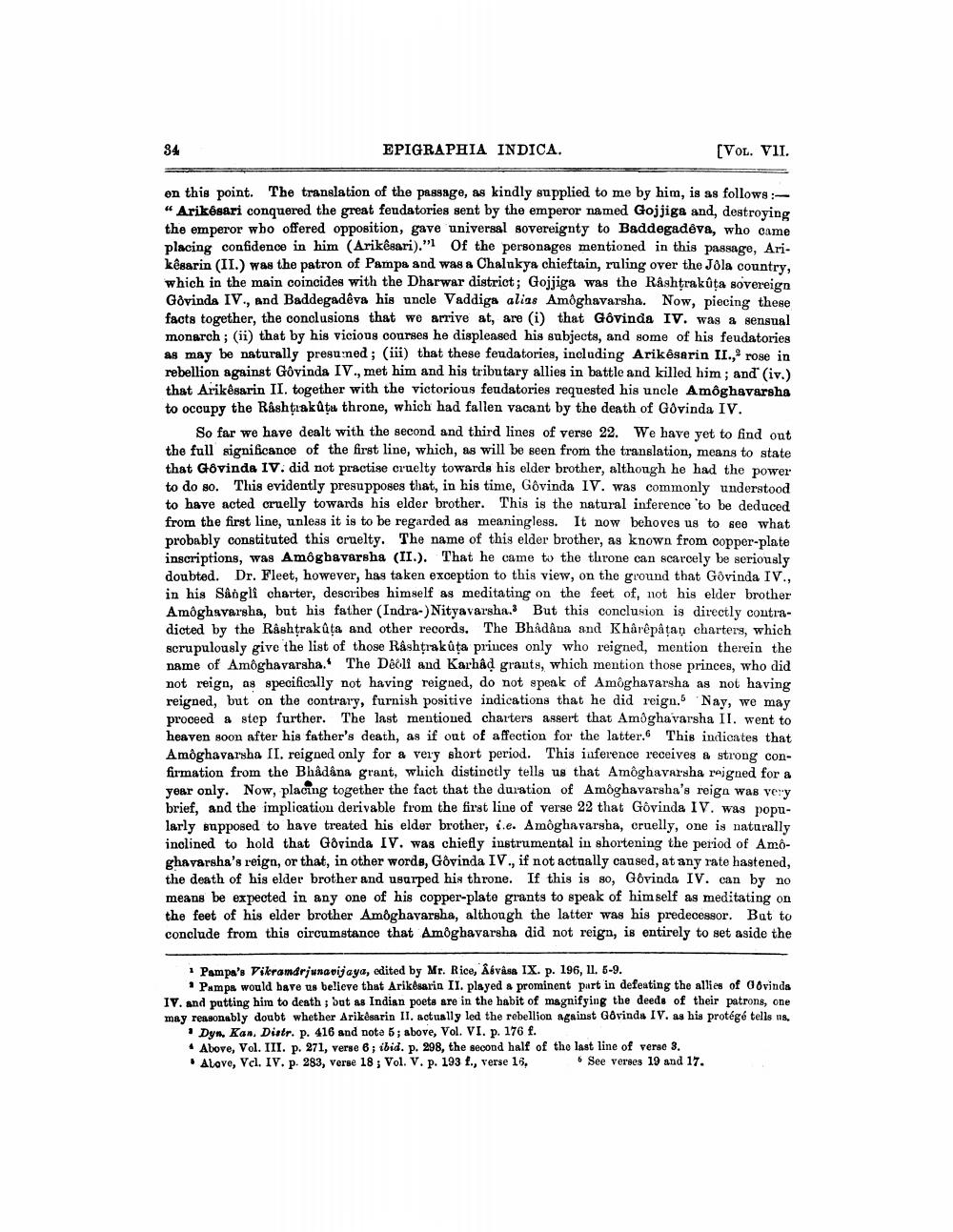________________
EPIGRAPHIA INDICA.
(VOL. VII.
on this point. The translation of the passage, as kindly supplied to me by him, is as follows: " Arikesari conquered the great feudatories sent by the emperor named Gojjiga and, destroying the emperor who offered opposition, gave universal sovereignty to Baddegadêva, who came placing confidence in him (Arikesari)."'l Of the personages mentioned in this passage, Arikêgarin (II.) was the patron of Pampa and was a Chalukya chieftain, ruling over the Jôla country, which in the main coincides with the Dharwar district; Gojjiga was the Rashtrakůta sovereign Govinda IV., and Baddegadêva his uncle Vaddiga alias Amoghavarsha. Now, piecing these facts together, the conclusions that we arrive at, are (i) that Govinda IV. was a sensual monarch ; (ii) that by his vicious courses he displeased his subjects, and some of his feudatories as may be naturally presu ned; (iii) that these feudatories, including Arikêsarin II., rose in rebellion against Govinda IV., met him and his tributary allies in battle and killed him; and (iv.) that Arikësarin II. together with the victorious feudatories requested his uncle Amôghavarsha to occupy the Rashţiakūta throne, which had fallen vacant by the death of Govinda IV.
So far we have dealt with the second and third lines of verse 22. We have yet to find out the full significance of the first line, which, as will be seen from the translation, means to state that Govinda IV. did not practise cruelty towards his elder brother, although he had the power to do so. This evidently presupposes that, in his time, Govinda IV. was commonly understood to have acted cruelly towards his elder brother. This is the natural inference to be deduced from the first line, unless it is to be regarded as meaningless. It now behoves us to see what probably constituted this cruelty. The name of this elder brother, as known from copper-plate inscriptions, was Amôgbavarsha (II.). That he came to the throne can scarcely be seriously doubted. Dr. Fleet, however, has taken exception to this view, on the ground that Gôvinda IV., in his Sångli charter, describes himself as meditating on the feet of, not his elder brother Amôghavarsha, but his father (Indra-) Nityavarsha. But this conclusion is directly contradicted by the Rashtrakūta and other records. The Bhadana and Khårêpåțan charters, which scrupulously give the list of those Rashtrakůța princes only who reigned, mention therein the name of Amôghavarsha. The Dedli and Karhâd grauts, which mention those princes, who did not reign, as specifically not having reigned, do not speak of Amôghavarsha as not having reigned, but on the contrary, furnish positive indications that he did reign. Nay, we may proceed a step further. The last mentioned charters assert that Amoghavarsha II. went to heaven soon after his father's death, as if out of affection for the latter. This indicates that Amôghavarsha II. reigned only for a very short period. This inference receives a strong confirmation from the Bhådana grant, which distinctly tells us that Amoghavarsha raigned for a year only. Now, placing together the fact that the duration of Amoghavarsha's reign was very brief, and the implication derivable from the first line of verse 22 that Govinda IV. was popularly supposed to have treated his elder brother, i.e. Amoghavarsha, cruelly, one is naturally inclined to hold that Govinda IV. was chiefly instrumental in shortening the period of Amoghavarsha's reign, or that, in other words, Govinda IV., if not actually caused, at any rate hastened, the death of his elder brother and usurped his throne. If this is so, Govinda IV. can by no means be expected in any one of his copper-plate grants to speak of himself as meditating on the feet of his elder brother Amoghavarsha, although the latter was his predecessor. But to conclude from this circumstance that Amoghavarsha did not reign, is entirely to set aside the
1 Pampa's Vikramdrjunavijaya, edited by Mr. Rice, Åbvisa IX. p. 196, 11. 6-9.
· Pamps would have us believe that Arikësarin Il. played a prominent part in defeating the allies of Govinds IV. and putting him to death, but as Indian poets are in the habit of magnifying the deeds of their patrons, one may reasonably doubt whether Arikësarin II. actually led the rebellion against Govindas IV. as his protégé tells ns.
• Dyn, Kan, Distr. p. 416 and note 5; above, Vol. VI. p. 176 f. * Above, Vol. III. p. 271, verse 6; ibid. p. 298, the second half of the last line of verse 3.
Alave, Vel. IV. p. 283, verse 18 ; Vol. V. p. 193 f., verse 16, 6 See verses 19 and 17.




